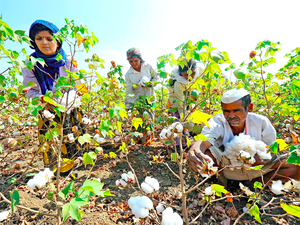The Challenges For Recognising Crucial Issues For
 (i.e., less than Rs.100 per bale). During the peak cotton season the lorry freight per bale between Gujarat ginning factory (the largest cotton producing state in the country) and spinning mills in Tamil Nadu (that account 47% of the spinning capacity in the country and producing less than 5% of its annual cotton requirement) was ruling upto Rs.1,000 per bale. The transportation cost for imported cotton from countries in West Africa to the spinning mills in Tamil Nadu was ruling around Rs.400 per bale. Therefore, the industry opted for the cotton transport by rail and ship. But, the price difference between lorry and these modes of transport was less than 10%. While competing countries are transporting cotton at a cheaper price, our cost is still high. Against this background, the cotton textile industry demanded relaxation of cabbotage rule for transporting cotton from ports in Gujarat to ports in Tamil Nadu and use foreign flag vessels to carry the cotton. At the direction of PMO, the Ministry of Shipping and DG shipping immediately convened the stakeholders meeting, facilitated reduction of cost by exempting the fuel used by the Indian flag vessels from Central Excise Duty and also 40% discount in the port handling charges. Since the Government did not exempted the fuel from Sales Tax and also the Indian flag vessels from Seafarer Tax, the cost remained high.
(i.e., less than Rs.100 per bale). During the peak cotton season the lorry freight per bale between Gujarat ginning factory (the largest cotton producing state in the country) and spinning mills in Tamil Nadu (that account 47% of the spinning capacity in the country and producing less than 5% of its annual cotton requirement) was ruling upto Rs.1,000 per bale. The transportation cost for imported cotton from countries in West Africa to the spinning mills in Tamil Nadu was ruling around Rs.400 per bale. Therefore, the industry opted for the cotton transport by rail and ship. But, the price difference between lorry and these modes of transport was less than 10%. While competing countries are transporting cotton at a cheaper price, our cost is still high. Against this background, the cotton textile industry demanded relaxation of cabbotage rule for transporting cotton from ports in Gujarat to ports in Tamil Nadu and use foreign flag vessels to carry the cotton. At the direction of PMO, the Ministry of Shipping and DG shipping immediately convened the stakeholders meeting, facilitated reduction of cost by exempting the fuel used by the Indian flag vessels from Central Excise Duty and also 40% discount in the port handling charges. Since the Government did not exempted the fuel from Sales Tax and also the Indian flag vessels from Seafarer Tax, the cost remained high.
For the original version including any supplementary images or video, visit https://economictimes.indiatimes.com/news/economy/agriculture/sima-hails-the-cabbotage-rule-relaxation-for-cotton-transport/articleshow/64304730.cms
Tactics Of [textile Testing] Demystified


ไม่มีความคิดเห็น:
แสดงความคิดเห็น